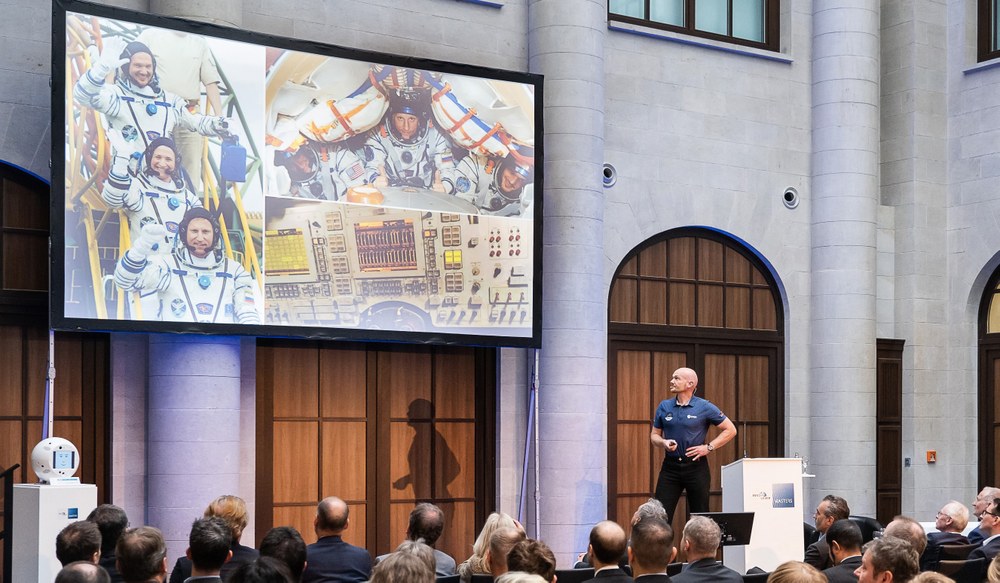Innovation and New Markets
The 'Innovation and New Markets' division aims to promote innovation in the German space sector from idea to market. Tools to achieve this include cross-industry networking, the initiation and promotion of technology transfer projects, the development of new markets and support for the commercialisation of space services and technologies. Another focus of the department is the promotion of start-ups through financial and technical support in the early start-up phase (incubation), financial advice and venture capital.
To achieve these goals, numerous projects are being realised and implemented, such as the INNOspace and 'Raumfahrt bewegt!' initiatives, the funding line for innovation and transfer projects within the National Programme for Space and Innovation, ESA’s 'Business Applications and Space Solutions' and the school and youth projects of the German Space Agency at DLR.
INNOspace initiative
The INNOspace initiative promotes innovation and the capitalisation of research and development results in the space sector, the marketing of cross-industry knowledge and technology transfer, as well as the pooling of space players to face the challenges of the new space economy, digitalisation and Industry 4.0. INNOspace encompasses all sorts of formats to accommodate these challenges. A few examples are the international innovation competition 'INNOpace Masters', conferences and expert workshops, the INNOspaceEXPO 'ALL.täglich!' and the INNOspace technology and cooperation networks.

The INNOspace Masters innovation competition, which has been held annually since 2015, is open to companies, start-ups, research institutions and universities, as well as individuals. The competition partners are Airbus, OHB, DB Netz AG and the ESA Business Incubation Centres in Germany. Each partner organises its own challenge in which different topics are addressed to multiple target groups. The core objective is to initiate innovative project ideas for the next generation of space exploration, based on pioneering transfer of expertise from other industries to the space sector (spin-ins) and vice versa (spin-offs). In the six rounds of the competition since it began in 2015, more than 530 project ideas have been submitted by over 1200 participants from 39 countries.
Exchanging ideas with other sectors makes it easier to come up with new apporaches and enables product and process innovations. The cross-industry INNOspace technology and cooperation networks were formed as a new branch to the INNOspace initiative in 2018. These networks are aimed at large companies, SMEs, start-ups, universities and research institutions as well as ministries, authorities and associations. The INNOspace networks Space2Motion, Space2Agriculture and Space2Health open up communication platforms between the field of spaceflight and the automotive, agriculture and healthcare sectors. The goal of the networks is to identify synergies and initiate joint developments. The INNOspace networks each have over 100 members, half of whom come from non-space sectors. Numerous co-operation projects have already been successfully initiated.
The INNOspaceEXPO 'ALL.täglich' is a travelling exhibition that draws public attention to the innovation and technology transfer potential of space exploration and research. Space research inspires innovations that also directly open up a wide range of new perspectives for life on Earth and influence everyday life. This is the core message of over 40 displays and exhibition units in five areas of life – living & working, health & nutrition, travelling & leisure, mobility & communication, and knowledge & education. The exhibition has already been hosted in 16 locations, including Berlin, Munich, Stuttgart and Lucerne.
Funding line for innovation and transfer projects in the National Programme
Since 2014, the German Space Agency at DLR has been funding innovation and transfer projects from the National Programme for Space and Innovation. The funding programme is open to companies, universities and non-university research institutions. Funding is provided for ideas with a high degree of innovation and transfer potential into and out of the space sector. The programme focuses on materials research, satellite technology, sensor technology, agriculture, mobility, health and other fields of technology. Project outlines can be submitted via the annual DLR Challenge of the INNOspace Masters competition or following announcements in the Federal Gazette.
ESA Business Applications and Space Solutions Programme
The ESA ARTES Business Applications and Space Solutions Programme (BASS) promotes the sustainable commercialisation of space applications through business solutions in order to make new scientific findings usable for a wide range of economic and social sectors. In particular, the programme supports market-oriented developments of products and services for various users that are based on the use of satellite-based communications, Earth observation and navigation or on human spaceflight technologies. This is used to develop commercial applications for industrial or everyday services. The scope of the topics includes, for example, mobility, energy, healthcare, education, agriculture, tourism and security.
The BASS programme also supports space-based start-ups through the ESA Business Incubation Centres (BIC) and the facilitation of networking between start-ups and venture capitalists, for example via the ESA Investors Forum. The company founders receive incentives, technical support and access to business networks. The ESA BIC Bavaria & Northern Germany and the ESA BIC Hessen & Baden-Württemberg operate seven locations in the following cities: Ottobrunn, Oberpfaffenhofen, Nuremberg, Bremen, Darmstadt, Reutlingen and Friedrichshafen. Another pillar of Space Solutions is the targeted implementation of development results from space exploration. The German Technology Transfer Brokers identify new utilisation opportunities for space technologies and mediate between technology providers and potential users.
School and youth projects
The school and youth projects of the German Space Agency at DLR bring knowledge about space technology into schools. How exactly does satellite communication work? How do you build a robotic arm? And what role does space exploration actually play in our daily lives? We provide pupils with answers to these and other exciting questions. The activities of the German Space Agency at DLR include the creation of teaching materials for STEM subjects, the design of digital learning content and the organisation of school competitions such as 'Earth Guardians'. Teachers can pull these eye-catching, didactically prepared materials directly into their classroom.
Contact
Dr. Franziska Zeitler


